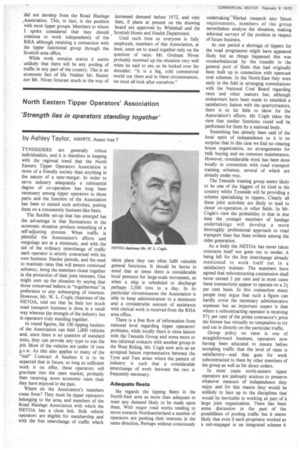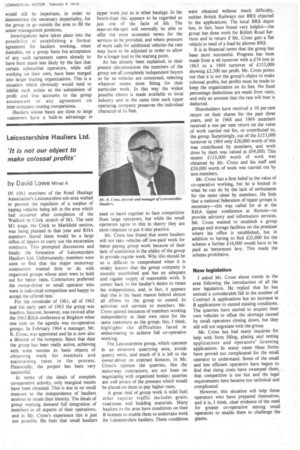North Eastern Tipper Operators' Association 'Strength lies in operators standing together'
Page 50

Page 51

If you've noticed an error in this article please click here to report it so we can fix it.
by Ashley Taylor, AMIRTE. Assoc lnst T
TYNESIDERS are generally robust individualists, and it is therefore in keeping with the regional trend that the North Eastern Tipper Operators Association is more of a friendly society than anything in the nature of a near-merger. In order to serve industry adequately a substantial degree of co-operation has long been necessary among tipper operators in those parts and the function of the Association has been to extend such activities, putting them on a consistently business-like basis.
The flexible set-up that has emerged has the advantage in that fluctuations in the economic situation produce something of a self-adjusting process. When traffic is plentiful the Association's efforts and outgoings are at a minimum, and with the aid of the ordinary interchange of traffic each operator is strictly concerned with his own business. Harder periods, and the need to maintain rates that will ensure continued solvency, bring the members closer together in the protection of their joint interests. One might sum up the situation by saying that those concerned believe in "togetherness" in preference to any submerging of interests. However, Mr. W. L. Cogle, chairman of the NETOA, told me that he feels too much road transport business is done in a small way whereas the strength of the industry lies in operators truly standing together.
In round figures, the 100 tipping hauliers of the Association can field 1,000 vehicles and, since there is no question of standard units, they can provide any type to suit the job. Most of the vehicles are under 16 tons g.v.w. As this also applies to many of the "tied" Contract A hauliers it is to be expected that in future, so long as sufficient work is on offer, these operators will gravitate into the open market, probably then receiving more economic rates than they have enjoyed in the Past.
Where do the Association's members come from? They must be tipper operators belonging to the area, and members of the Road Haulage Association with which the NETOA has a close link. Bulk vehicle operators are eligible for membership and with the free interchange of traffic which takes place they can Often fulfil valuable general functions. It should be borne in mind that at times there is considerable local pressure for large-scale movement, as when a ship is scheduled to discharge perhaps 3,500 tons in a day. In its particular circumstances the Association is able to keep administration to a minimum and a considerable amount of assistance with clerical work is received from the RHA area office.
There is a free flow of information from national level regarding tipper operators' problems, while locally there is close liaison with the Teesside Group and some more or less informal contacts with another group in the West Riding. Mr. Cogle now acts as an accepted liaison representative between the Tyne and Tees areas where the pattern of industry is such that a considerable interchange of work between the two is frequently necessary.
Adequate fleets He regards the tipping fleets in the North-East area as more than adequate to meet any demand likely to be made upon them. With major road works tending to move towards Northumberland a number of operators are pushing their interests in the same direction. Perhaps without consciously
undertaking—r—narket research into future requirements, members of the group nevertheless analyse the situation, making informal surveys of the position in respect of future business.
At one period a shortage of tippers for the road programme might have appeared likely but as things happened this was counterbalanced by the transfer in the general pool of fleets that had originally been built up in connection with opencast coal schemes. In the North-East they were early in the field in arranging consultations with the National Coal Board regarding rates and other matters but, although endeavours have been made to establish a • satisfactory liaison with the quarrymasters, there is so far little to show for the Association's efforts. Mr Cogle takes the view that similar functions could well be performed for them by a national body.
Something has already been said of the local spirit of independence so it is no surprise that in this case we find no clearing house organization, no arrangements for bulk buying and no common maintenance. However, considerable work has been done locally in connection with road transport training schemes, several of which are already under way.
The Teesside training group seems likely to be one of the biggest of its kind in the country whilst Tyneside will be providing a scheme specializing in tippers. Clearly all these joint activities are likely to lead to closer co-operation, in other fields. In Mr. Cogle's view the probability is that in due time the younger members of haulage undertakings will develop a more thoroughly professional approach to road transport than has been evident among the . older generation.
As a body the NETOA has never taken contracts itself nor gone out to tender, it being left for the free interchange already mentioned to work itself out in a satisfactory manner. The members have agreed that subcontracting commission shall never exceed 5 per cent and in most cases these transactions appear to operate on a 2+ per cent basis. In this connection many people may argue that such a figure can hardly cover the necessary administrative expenses but an important aspect is that where a subcontracting operator is receiving 97+ per cent of the prune contractor's price the former has virtually no temptation to try and cut in directly on the particular traffic.
Group policy on rates is one of straightforward business, operators now having been educated to ensure before accepting traffic that the level of rates is satisfactory—and that goes for work subcontracted to them by other members of the group as well as for direct orders.
In most cases north-eastern tipper operators are jealously anxious to preserve whatever measure of independence they enjoy and for this reason they would be unlikely to face up to the disciplines that would be inevitable in working as part of a large joint organization. There has been some discussion in the past of the possibilities of pooling traffic but it seems likely that even if each proprietor worked as a sub-manager in an integrated scheme it would still be important, in order to demonstrate the necessary impartiality, for the group to go outside the area to fill the senior management positions.
Investigations have taken place into the possibility of establishing a formal agreement for hauliers working, when desirable, on a group basis but acceptance of any such agreement seems already to have been made less likely by the fact that certain substantial operators, while still working on their own, have been merged into larger trading organizations. This is a situation which obviously would tend to inhibit such action as the submission of profit and loss accounts to the group accountant or any agreement on inter-company costing comparisons.
Hauliers whose bases are close to large customers have a built-in advantage in tipper work just as in other haulage. In the North-East this appears to be regarded as just one of the facts of life. The man-on-the-spot will normally be able to offer the most economic terms for the services to be provided, and where pressure of work calls for additional vehicles the rate may have to be adjusted in order to allow for a longer lead to the starting point.
As has already been explained, in their present circumstances the members of the group are all completely independent buyers so far as vehicles are concerned, selecting whatever seems most fitting for their particular work. In this way the widest possible choice is made available to local industry and at the same time each tipper operating company preserves the individual character of its fleet.


















































































































































